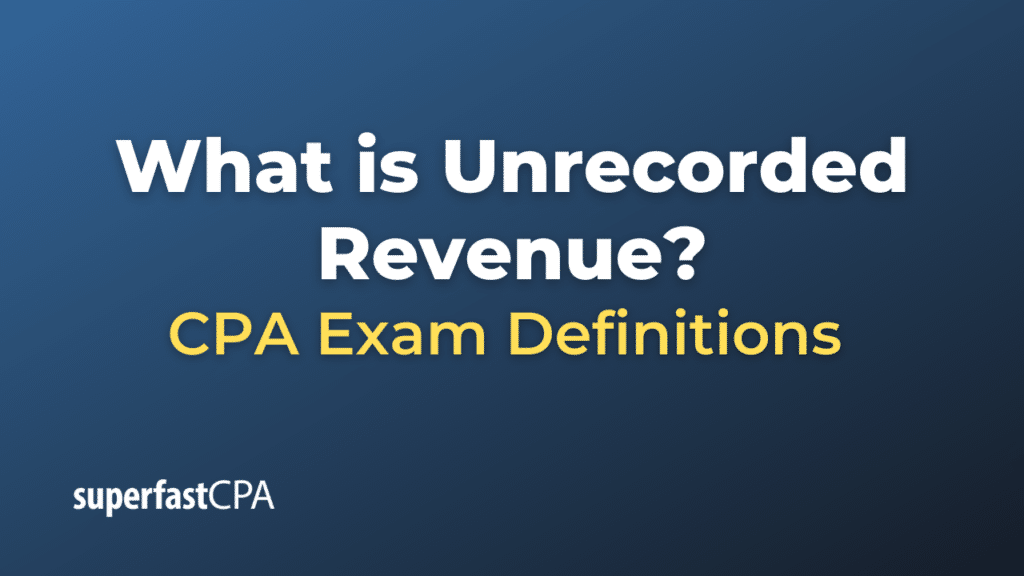Unrecorded Revenue
Unrecorded revenue refers to revenue that a company has earned but has not yet recognized or recorded in its financial statements. Generally Accepted Accounting Principles (GAAP) in the United States, or other accounting standards like International Financial Reporting Standards (IFRS), dictate when revenue should be recognized. According to these accounting standards, revenue is usually recognized when it is both earned and realizable, meaning the service has been performed or the product has been delivered, and payment is either received or is reasonably assured to be received in the future.
However, there are cases where revenue may be earned but not yet recorded, due to various reasons such as timing, oversight, or complexities in the accounting process. It’s essential for companies to eventually recognize this unrecorded revenue to present an accurate and fair view of their financial health.
Examples of Unrecorded Revenue:
- Services Rendered but Not Yet Billed: A law firm may have provided legal services to a client in December but hasn’t yet sent out the invoice by the year-end. The revenue from these services is earned but unrecorded.
- Goods Delivered but Payment Pending: A company may have shipped products to a retailer under terms that payment will be received in 60 days. Until the revenue is recognized, it remains unrecorded.
- Subscriptions and Prepayments : If a company receives payment for a year-long service subscription, it can’t recognize the entire amount as revenue immediately. Instead, the revenue must be recognized monthly over the year. Any revenue corresponding to future months is considered “unearned” and thus is unrecorded as revenue (it would typically be recorded as a liability like “Deferred Revenue” or “Unearned Revenue“).
- Commission-Based Sales: In some businesses, sales agents make deals that involve future payments or contingent terms. Revenue from such sales may be earned but remain unrecorded until certain conditions are met.
Why It Matters:
Unrecorded revenue can have several implications:
- Financial Statements: Failure to record revenue that has been earned can understate a company’s financial performance and could mislead investors, creditors, or other stakeholders.
- Tax Implications: Not recording revenue can also have tax implications, as taxes are generally based on recorded income.
- Compliance and Auditing: Non-compliance with accounting standards can result in legal issues and make a company subject to penalties or audit scrutiny.
- Cash Flow Management: Properly recognizing revenue is crucial for accurate cash flow forecasting and management.
To handle unrecorded revenue, companies often make adjusting entries at the end of an accounting period, especially when preparing for financial audits. These adjustments help align the company’s financial records with accounting standards, providing a more accurate picture of its financial health.
Example of Unrecorded Revenue
Let’s consider a simple example involving a consulting company to illustrate the concept of unrecorded revenue.
Scenario:
- ConsultMe Inc. is a consulting firm that charges $200 per hour for its services.
- Client A engaged ConsultMe Inc. for a project requiring 50 hours of work.
- The work was completed in the month of December, but due to year-end administrative delays, the invoice for the project was not sent out until January of the next year.
Calculating Unrecorded Revenue:
- Unrecorded Revenue = Hours worked * Hourly rate
- Unrecorded Revenue = 50 hours * $200/hour
- Unrecorded Revenue = $10,000
At the end of December, ConsultMe Inc. has $10,000 in unrecorded revenue because it completed the work for Client A but did not yet invoice the client or record the revenue in its accounting system.
Implications and Actions:
- Financial Statements: If ConsultMe Inc. is preparing its financial statements for December, it would need to make an adjusting journal entry to recognize the $10,000 as revenue and as an accounts receivable. This ensures that its income for December accurately reflects services rendered.
- Tax Implications: Recognizing the $10,000 as revenue will have tax implications. Taxes will need to be calculated based on this newly recognized revenue, depending on tax laws and accounting practices applicable in ConsultMe Inc.’s jurisdiction.
- Audit and Compliance: If the company is subject to an audit, not recording this revenue could lead to complications and might require further adjustments and explanations. Adhering to accounting standards is crucial for compliance.
- Cash Flow: Understanding that this revenue has been earned but not yet received can help ConsultMe Inc. in cash flow planning, ensuring they account for this pending cash inflow.
By recognizing the unrecorded revenue, ConsultMe Inc. can accurately represent its financial performance for December, remain in compliance with accounting standards, and plan its cash flows more effectively.













